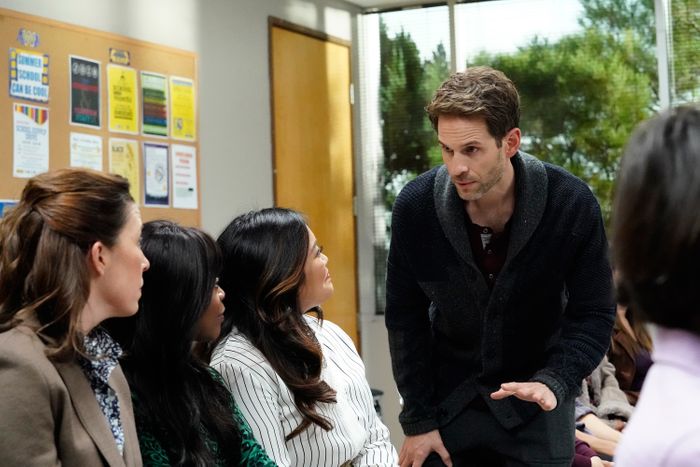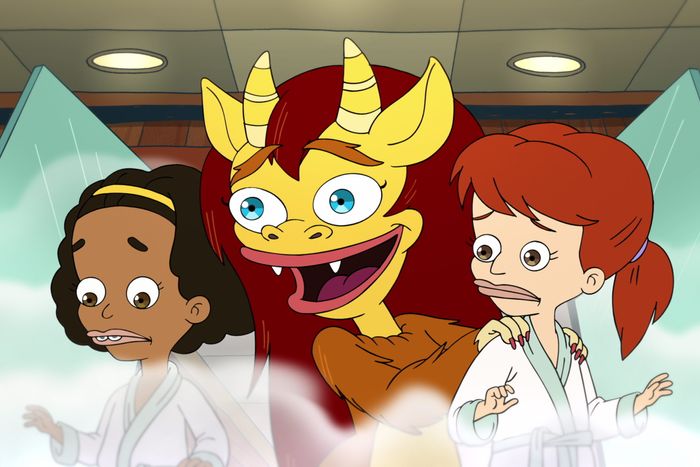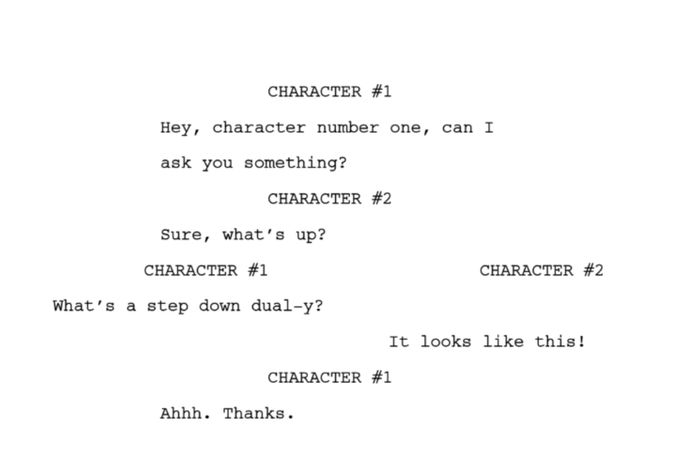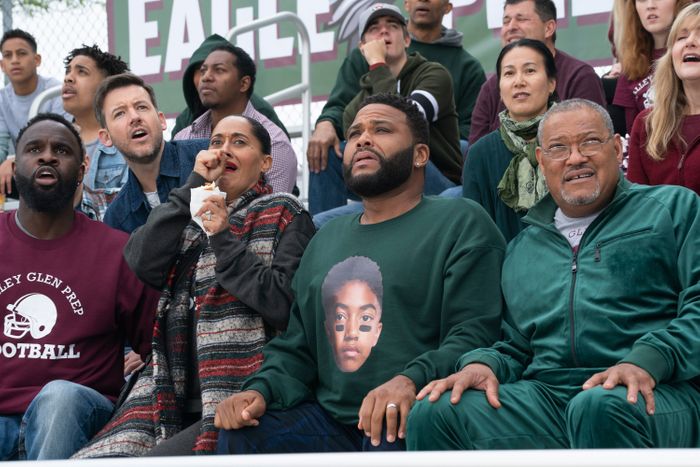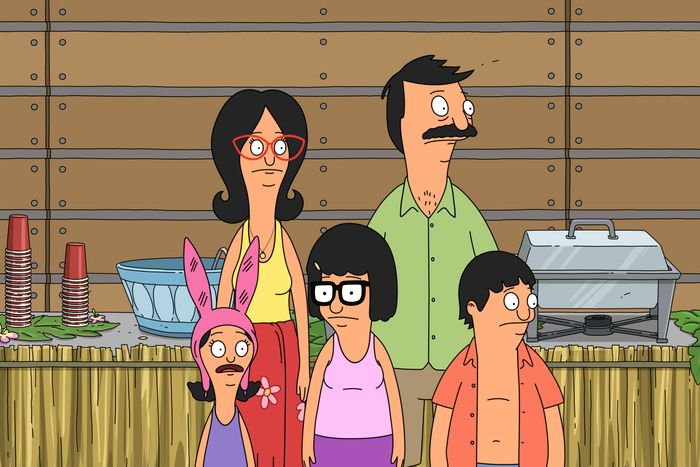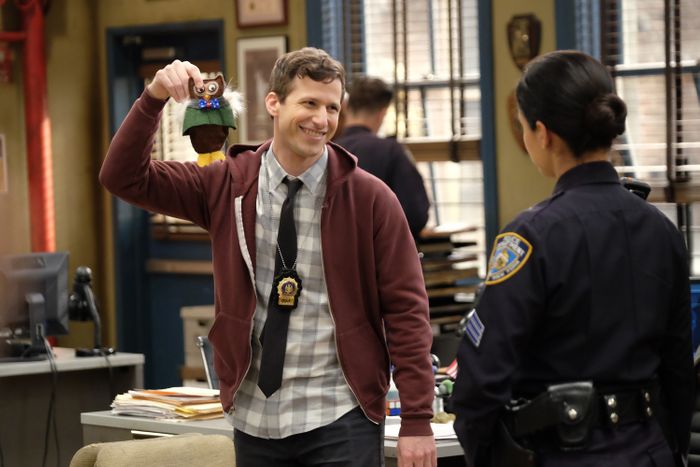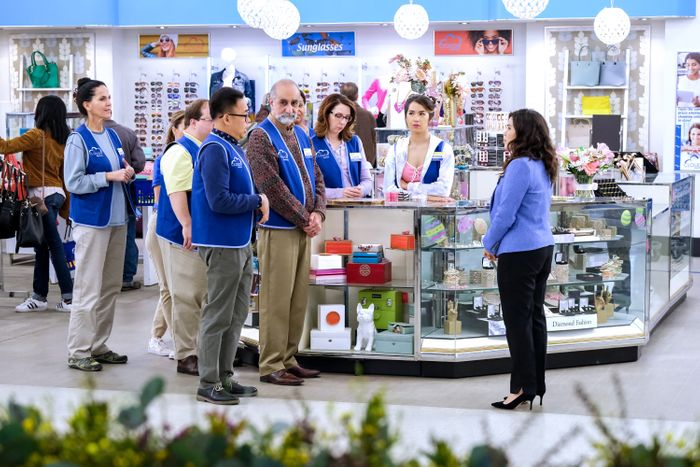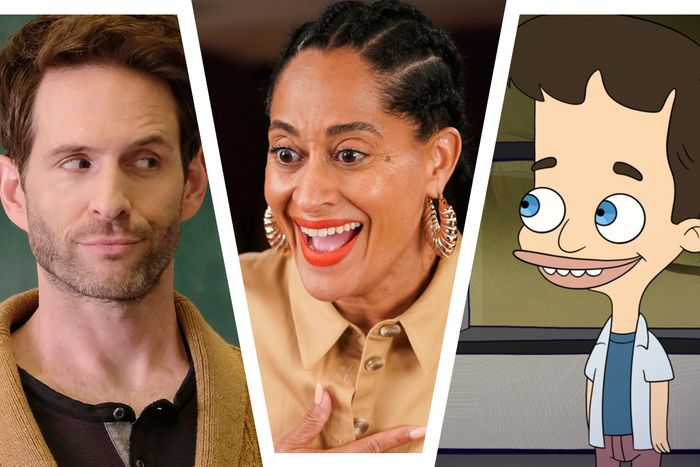
A few weeks ago, Simpsons executive producer Matt Selman tweeted a list of the show’s writers room terminology, explaining how he and his colleagues use terms like “wacky stack” to describe “too much silliness at once”:
Our curiosity piqued, Vulture reached out to the writers of Black-ish, Brooklyn Nine-Nine, Bob’s Burgers, Big Mouth, Superstore, and A.P. Bio to see if they had any similar insider lingo and running jokes that help them get through story pitches and rewrites. They were kind enough to run through many of the terms that are bandied about in their offices, many of which come from other shows, overlap between writers rooms with different meanings, or have vague origins that are lost to time.
As a very meta example, current A.P. Bio writer and former Simpsons staffer Donick Cary shared “The Simpsons Did It.” “It’s what a lazy writer says when they don’t like a joke,” he explains. “We’ll get into a debate about what joke does or doesn’t go in, and that’s kind of the argument ender, that it was already done somewhere else. For 20 years, I’ve heard ‘The Simpsons did it,’ and I’m often like, ‘I was in the room when The Simpsons did that. It’s totally different.’ And then I still get argued down.”
Read on for many more examples of terms like this and behind-the-scenes stories from these producers and writers, such as what a “Summer Frankenstein” script is, why they try to avoid “refrigerator logic,” and why one writer threatened to stab her co-workers.
A.P. Bio
The Chips
Mike O’Brien, showrunner: We talk about “What are the chips of an episode?” because in season one, Jack, the main character, is obsessed with getting healthy food taken out of the vending machine and chips put back in. It leads him down a series of events that becomes much bigger, to where he’s battling Marcus, one of the annoying students in his class. We had a line in there where someone said, “It’s just about the chips, Jack?” and he said, “It’s 80 percent getting Marcus, 20 percent chips. I do want the chips, but they’re more a symbol.” The episode isn’t really about chips, but it really was over-discussed, so now we’ll say things like, “Making the perfect dinner is the chips, and the real thing he’s going for is a good date.”
Chuffah
Shelly Gossman, writer: It’s when you go into the top of a scene and whatever someone is saying is all non sequiturs. Is that Yiddish?
Donick Cary, writer: I always thought it was just filler, like we just need a couple of actors to be saying something before we get to the point. Chuffahs almost always get cut.
Jeffing
O’Brien: It’s a verb based on our writer Jeff Vanderkruik. It’s pitching something exactly word for word that was pitched within the last two minutes because you were in your own head, thinking. It’s awkward for a second because everyone’s like, “Do we tell this person that Mark just said that?” Now you’re like, “Oh, did I just Jeff? I think I’m Jeffing.” Part of the fun of that is Jeff only did it once and it got named to him forever, and he was very annoyed that it was called Jeffing when it wasn’t a problem he had. I probably did it more often than him. Everyone did. But he did it first.
Lateral Pitches Get Stitches
O’Brien: Shelly initiated this when I was out of the room. It’s like “snitches get stitches,” and she, I guess, would cut someone with a knife if someone made a pretty good joke and someone else made a lateral pitch, an equally-good-but-not-beating-it joke. People told on her when I got back: “She’s enforcing this crazy rule, ‘lateral pitches get stitches,’ so we don’t even feel like we can pitch.”
Gossman: And it’s used against me! It was me saying, “If you think we have a good enough joke for the table read — because we’ll get another chance to make this funnier — we’ve gotta move on because we’re running out of time.” I never heard the end of it.
Little Booty
O’Brien: This was grandfathered in from Marlon by Britt Matt. We call spillover onto an otherwise mostly blank page “little booties” or “big butts.” So you’re like, “The script is 31 pages, but it’s really 30 because it only goes two lines onto that last one. It’s just got a little booty on there.”
Cary: You have all the middle-aged white guys using phrases that very clearly came from Marlon. It’s now just part of our vernacular in here.
Shoe Leather
O’Brien: Too much blocking: “That’s a lot of shoe leather to have that character go all the way to the door and back.” It’s another generic one that comes up in writers rooms.
Cary: Before sneakers were all the craze!
Whatever Barrel
O’Brien: There’s “sock barrel.” We just say “whatever barrel.” “We’re in a poop barrel,” or whatever you’re hitting too often. I think it’s like if you reached into a barrel in the dark and pulled out three pairs of socks, the odds are that two of them will match something. You’re just saying you have too much of one type of joke, but if you ever find out what the fuck the origin of that term is, I’d be interested.
Big Mouth
Fat Boy
Andrew Goldberg, co-creator: When a page has a big space at the bottom because there’s a long speech or something on the next page, we call that a
“fat boy,” because the bottom margin is very fat. The half of us who are super anal don’t like fat boys, so we feel a great deal of relief when we can tighten up a stage direction to lose a line on the page and pull up that fat boy. Not to body shame script pages, but that’s what we call them.
Step Down Dual-y
Goldberg: It’s when you’re doing dual dialogue but you want one person to start to say something a little bit sooner than the other. You put a blank line in the script so the other person on the side of the dual dialogue is a little lower. I think I should just email you what it looks like. It’s so hard to explain.
Temp Theater
Goldberg: When we put together our radio plays, which is what the animators draw to, we’ll listen to them and often we’ll say, “These two parts don’t quite work. We’re going to rewrite them now.” Instead of bringing in all the actors, we will have Nick [Kroll] and the writers do what we call “temp theater.” We all go into our audio editor’s office, pass around an iPhone, and “temp” the lines from the script that we just rewrote before we get the actual actors. Nick does a great Duke Ellington.
Black-ish
5 Percenter
Jonathan Groff, executive producer: When somebody pitches a joke that only a small percentage of the audience will get. Sometimes you put those in like a little hidden almost Easter egg that we know only a small percentage of the audience will get.
The Biggest Crabs
Groff: I imported this saying from my grandfather: “Eat the biggest crabs first. That way you’re always eating the biggest crabs.” When we’re breaking stories and somebody will be like, “Why don’t we save that idea for later in the season?” I’ll say, “Well, why don’t we do it now? Let’s just figure it out. Let’s eat the biggest crabs first.” Do the best idea right away instead of trying to save it or forget about it.
Buff-Carc
Groff: This comes from a culturally appropriative term, which is like, “Let’s be like the Plains Indians and use the whole buffalo.” We’ll do everything we can to save stuff we like, and the shorthand for that became “buffalo carcass,” then somebody turned it into “buff-carc.” “That piece that didn’t work here. We’ll buff-carc it into another scene.”
Cutting Is Punching
Groff: “Punching” means making the script funnier. Sometimes just by removing stuff that isn’t working, it’ll make the script funnier without adding a joke. My friend Chuck Tatham also taught me “a surgeon cuts to heal” — insofar as we’re surgically operating on a script, cutting something out can actually make it better.
Czechoslovakia
Groff: This is one I think every show says. “This next page was Czechoslovakia,” meaning there are tons of checks on it — those jokes all worked. “You know how I know this page is Prague? Because there are lots of checks.”
Hat on a Hat
Groff: There are a lot of terms that go across all shows. “Hat on a hat” is when you do an extra joke on top of a joke that’s already working. It’s adoring something too much. Adding florid language at the end is like putting a hat on a hat. A good hat doesn’t need another hat on top of it.
Hot Fight
Groff: It’s exactly what it sounds like. With Dre’s attitude, he’s likely to butt heads with Bow, his dad, or whomever, so we’ll say, “Top of Act Two — hot fight!” In our first season, when we were putting the story up on the board, [writer] David Hemingson would go, “And then we got to this, ‘Fuck you, fuck you,’” like the shorthand for what was happening in the scene. It’s serious conflict: “Fuck you, fuck you. Hot fight.”
Pops Ex Machina
Groff: Sometimes Dre or Bow will be acting crazy for part of the episode, and then in Act Three, Pops or Ruby would provide some wisdom about it. It’s dangerous because it can be kind of a crutch: “Oh, yeah, Pops will just give Dre the answer at the 11th hour.”
Set It and Forget It
Groff: This comes from Ron Popeil’s infomercials selling the Showtime Rotisserie Ovens. He would say, “Set it,” and the studio audience would say, “And forget it!” Sometimes we’ll be noodling with a joke, changing the wording, and then we’ll realize the original version was better. Just go back to the original.
Tuesday Us
Groff: We do our table reads on Tuesdays. When it’s Friday night and we want to get the draft out before the weekend so you’re not rewriting it Monday, we’ll say, “That’s Tuesday us,” meaning you’re postponing work because you know you’ll have another crack at it.
Up and Back
Groff: When you have a character go have some conflict or an argument, but the story doesn’t advance. It’s like going up and back down a hill — you’re climbing this hill of dramatic tension but not really going to go further up the mountain.
Bob’s Burgers
Blow Dart
Rich Rinaldi, writer: Early in a story-breaking room, maybe someone’s hearing the story for the first time and they’re pointing out a flaw in the story — like it’s too similar to another episode or it’ll ruin the plot. While the person is bringing up the concern, someone else in the room is silently blow-darting them with like a tranquilizer dart that will shut them up and not kill the fucking story. The shorthand is, “Sorry, you’re going to hate me. I have a blow dart for that spot.”
K4N
Rinaldi: When we’re running long, we might have to cut a joke or tweak a story line, but if we love something, our bosses call it a “keep for now,” which we shortened to “K4N.” Knowing you can cut stuff downstream is nice because we can have long good-byes to things that we’ve fallen in love with. One example is where Jon Schroeder, the writer, had this idea that made almost no sense to anybody but him: a three-bean-salad party where everyone was going to bring a different bean.
Dan Fybel, writer: It was a K4N and it made the episode. And then Entertainment Weekly put it in some page of like highly quotable moments from your favorite TV shows, so Jon photocopied it and taped it up outside of his office. It lived there for years and we were like, “Oh my God, fine. You win.”
Kid Pepper
Fybel: You go through a scene and it turns out that it’s really light on some characters, like our kids, or the plot is getting a little chunky, we say, “We need to go back and add some kid pepper.” We’re very blessed by having Kristen Schaal, Eugene Mirman, and Dan Mintz as the kids on the show. They’re fucking amazing. If we ever got into trouble in a scene, we just feed them stuff and they play with it. It’s the secret spice.
Series Runner
Fybel: If we maybe messed up and put something one too many times out there into the world. We generally won’t do something if we’ve already done it, but sometimes we do.
Rinaldi: We’ll say, “We’ve done that three times. Is it a character trait now? Did we just own that? Series runner?”
Fybel: We have that with Linda going, “Ow, my face!”
Rinaldi: Even with Gene, with his kind of affection toward his mom that borders on infatuation where he’s breastfeeding until he was 6 or actually trying to crawl up back into the womb.
Summer Frankenstein
Rinaldi: It’s like a Frankenstein. The summery-ness of it is, picture Frankenstein wearing a Hawaiian shirt. We realize we have a bunch of ideas smooshed together and it’s not going to go hold itself together without that Hawaiian shirt.
Table Candy
Rinaldi: We have so many fans at our live table reads now, it’s just amazing. We might throw in a “fuck” or “shit” for the crowd to get a little shock.
Fybel: That’s the table candy that we’ll get out before we record. Like we had Jon Benjamin as Bob talking to a guy who looked so young and was in really good shape. He asks, “How old are you?” and the guy says, “49.” Bob just said, “Fuck you.”
Tell and Show
Rinaldi: [Creator] Loren Bouchard likes building our audio tracks, letting naturalistic dialogue and improv flow. One perspective he’s always had is that you should be able to enjoy the show just by listening to it. Usually in television or film, which are visual mediums, it’s “show, don’t tell,” and he coined the term “tell and show.” Sometimes it’s “tell, don’t show.” Oftentimes, we put things in dialogue while we’re showing them just for the modern viewer who may be drifting off.
Fybel: Yeah, you can be walking around your house doing stuff while the show is on.
Brooklyn Nine-Nine
Bad Words Version
Dan Goor, co-creator: It’s like basically saying, “This is a bad pitch, but it goes something like this. I don’t fully have it figured out. Give me a break.”
Belt and Suspenders
Goor: Where you give multiple justifications for a plot action. It’s overly reinforced. It could be a situation where a person has to do a thing because if they do it, they’ll become commissioner and if they don’t do it, their father will be killed. Sometimes it can be overkill, but sometimes it can be really good to reinforce it.
Candy Bag
Goor: The list of our favorite alt jokes we have on set. It’s a terrible term.
Frankenstein
Goor: When you assign multiple writers to write different parts of a script and then you put it all together like Frankenstein.
Goldilocks
Goor: A story document told with the level of detail that you would tell the Goldilocks story. So, not every joke, not every description, just a very plain version of the story.
Invisible Weakener
Goor: A good joke that, in the moment, you’re like, “This is great!” but it weakens the plot. They don’t all get cut. If you look at our Pontiac Bandit stories, Jake’s friendship with the Pontiac Bandit is so funny to us and they’ll go down an avenue of joking with one another. But our story might be that Jake doesn’t trust the Pontiac Bandit, yet he starts to have fun with him. We’re not trying to say that Jake is softening toward him; it’s just that those jokes were fun to write.
J on a J
Goor: It stands for “joke on a joke,” which is “hat on a hat.”
Vomit Draft
Goor: When you write without stopping to edit along the way. You get it out and then you can worry about stuff afterward.
Superstore
Hey May
Justin Spitzer, executive producer: It’s an act break or big moment. I’ve heard it comes from a long time ago — some guy watching the show and yelling to his wife, “Hey, May! You’ve got to come here and see this!”
Refrigerator Logic
Spitzer: It’s something that would only be logical in retrospect. I think it comes from after the show is over, someone goes to the refrigerator to get a snack and they think, Wait a minute. Did that make sense?
Schmuck Bait
Spitzer: Where you’re asking the audience to invest in something that only a schmuck would believe is going to happen. It’s like a story where one of your main characters might leave or die and you’re asking the audience to truly invest in it, but any rational person knows the character isn’t going anywhere.
Sock Barrel
Spitzer: When you have two jokes that feel like they refer to each other, but you don’t mean them to. It ends up confusing things. It’s like if you had a barrel of socks and you picked out two that were vaguely similar but they weren’t really a pair.
Squee
Spitzer: This one comes from The Office. When we would do Jim and Pam stuff, we would look at message boards — I think it was Television Without Pity — and when people would get excited about Jim and Pam doing cutesy romantic stuff, they would write “squee!” At first it was used mockingly, and over time it became, “All right, we need to get some squee in here. We need to give the fans a little romance.”


